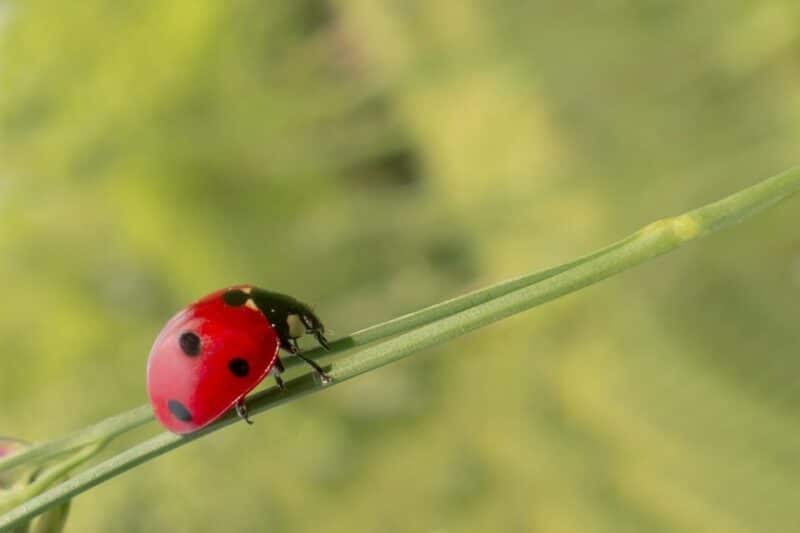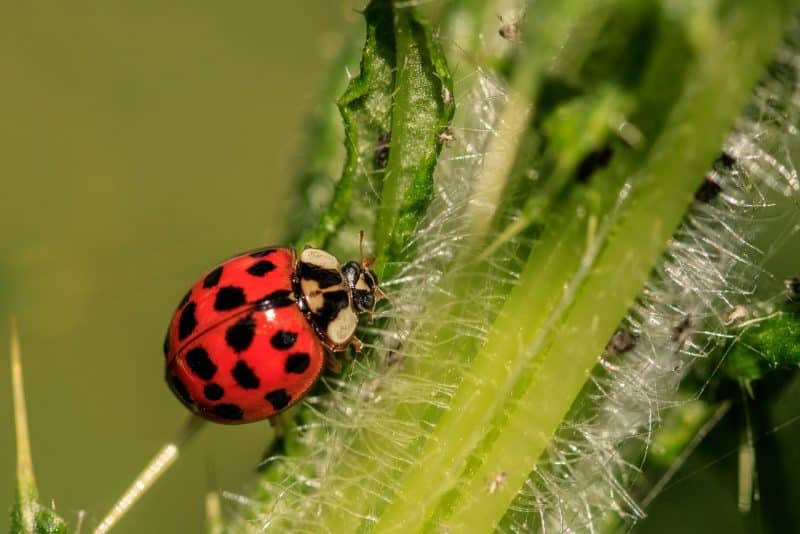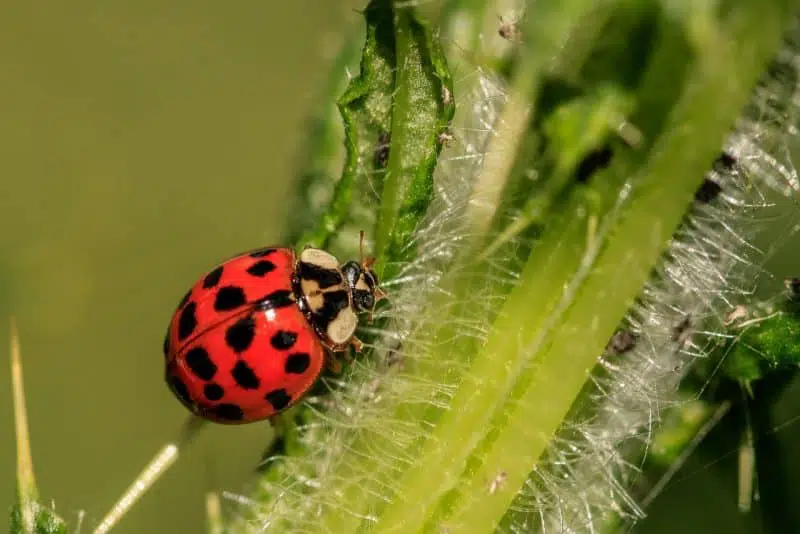Join us in Exploring the Myth: Do Ladybugs Bite?
Ladybugs are truly fascinating creatures, with their symbolic red hue, bold black spots, and playful antics sure to bring joy to even the grumpiest of individuals. From using their infestations as natural pest control for your garden to releasing them during special celebratory moments, ladybugs are exciting creatures to learn about.
But have you ever seen a ladybug and wondered if it can bite? Or what do the spots on its back mean? Let’s dig into this adorable bug and learn more about what makes them charming!
Want to fly ahead? Click below
Do Ladybugs Bite?

Ladybugs are beloved insects for their symbolic red hue and bold black spots. Though these charming creatures are inviting, many wonders if ladybugs bite, and the answer is no!
The reasons why ladybugs don’t bite lie in both their anatomy and behavior. In addition to this, they also have chewing mouthparts that help them eat aphids (a type of tiny plant-sucking insect). However, these parts lack any venom or toxins that could be used to harm humans or other animals.
Ladybug behavior also plays a role in whether they can bite or not. For the most part, these insects are pretty peaceful and non-aggressive. When threatened by larger predators such as birds, cats, or even humans, they usually fly away rather than attempting to attack or defend themselves from the threat. In some cases, however, a ladybug may try to “escape” by crawling onto a person’s skin – but it won’t bite down and injure you!
Though ladybugs are harmless to humans, some other insects look similar, which may cause some confusion – some of which do have the ability to bite humans!
The most common is the Asian lady beetle which can often be misidentified with an actual ladybug due to its similar coloring and patterning. However, these beetles have small pincers near their heads, which can give people painful bites if mishandled! Therefore identify any potential insect before taking it just to be safe!
While we love our little ladybugs here on Earth – they don’t pose any real threat to biting people! So next time you come across one of these cute little critters, sit back and enjoy watching them flutter around your yard without fearing being bitten!
What To Do If I Get Bitten By A Ladybug?

Though it’s scarce, there are occasions when a ladybug may bite you! If you feel you are held in this situation, here’s what you should do:
• Identify The Bite
Ladybugs have small mouths and won’t typically break skin when they bite. Therefore, if you feel a sharp pinch or some pain, it’s most likely from another bug, such as a mosquito or spider. To make sure, look for tiny red puncture marks on your skin.
• Wash The Bite
Once you’ve identified the bite as being from a ladybug, wash the area with soap and warm water.
• Seek Medical Attention
If redness persists after 24 hours or symptoms worsen, seek medical attention immediately, as ladybugs can sometimes transmit bacteria through their bites.
• Monitoring Your Health
Monitor your health in the days following the bite; look out for signs of infection, including fever, chills, and extreme fatigue that could signal something more severe than just a bite from a ladybug.
What To Do If Ladybugs Bite?

If a ladybug has bitten you, it’s essential to stay calm. Ladybugs might look cute and innocent but can deliver a surprisingly painful bite. To reduce the pain of the edge, apply a cool compress or ice pack directly to the area for about fifteen minutes.
Over-the-counter antihistamines or anti-inflammatory medications such as ibuprofen can also help with itchiness and discomfort after being bitten by a ladybug. It’s also essential to thoroughly wash your hands with antibacterial soap to reduce any chances of infection. Still have questions? Contact your local doctor or veterinarian since they can provide additional advice about ladybug bites in your area.
Ladybug Myths And Legends

Ladybugs have been shrouded in mystery, with many mythical stories and legends created around them.
Following are some of the most popular ones:
Ancient Symbol Of Good Luck
Since ancient times, ladybugs have long been seen as a sign of good luck and fortune. In Europe, it was believed that your wishes would come true if one ladybug landed on you! This belief has carried through to the modern day, with some people even releasing ladybugs into the sky during special occasions like weddings or graduations in hopes of blessing their loved ones with luck and prosperity.
The Legend Of Midsummer’s Eve
According to an old European legend, a swarm of ladybugs descended from the heavens on midsummer’s eve to protect children from evil spirits who wished to cause them harm. This story is so beloved that it is still depicted in folklore today, often portrayed in novels and artworks where a group of ladybugs flies down from the sky to protect innocent children from danger.
The Folklore of Number 13
One popular superstition about ladybugs revolves around the number 13 – it is said that the number of spots on a ladybug’s back will always add up to 13! While this may be a myth, counting each site on a ladybug’s back is still fun whenever you catch one!
Learn more about What’s So Unlucky About the Number 13?
The Meaning Behind Those Spots
Another myth surrounding ladybugs revolves around the meaning behind their spots – they’re believed to represent how many years you’ll have good luck, with each dot representing one year! So if you ever find yourself lucky enough to spot a ladybug with six spots, you’ll be blessed with six years of good luck!
No matter your beliefs about these fascinating creatures, one thing’s certain – Ladybugs bring magic and wonder into our lives!
Wrapping Up on Do Ladybugs Bite
Regarding the question, do ladybugs bite? The answer is both yes and no. However, it doesn’t mean you should put them in your pocket. As with all insects, there’s always a risk of getting pinched if mishandled.
Overall, ladybugs are gentle creatures with an essential role in nature and gardens alike. They might still show some defensive behavior if provoked too much. So while they won’t bite you directly, always remember to handle them carefully when you come across one!
Thanks for following along with us! Next up What do dragonflies eat?
- Heroic Cat Races Toward Accident Scene ‘Determined To Help’ In Colorado - April 23, 2024
- Cobra vs. Hippo - April 23, 2024
- Watch Bald Eagle Rescued By River Rafting Team - April 23, 2024


